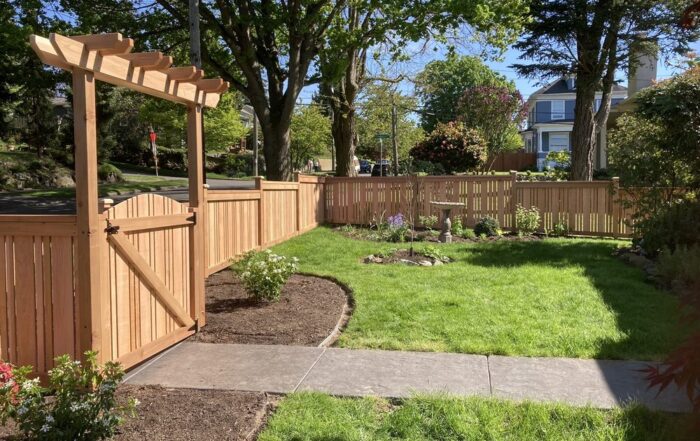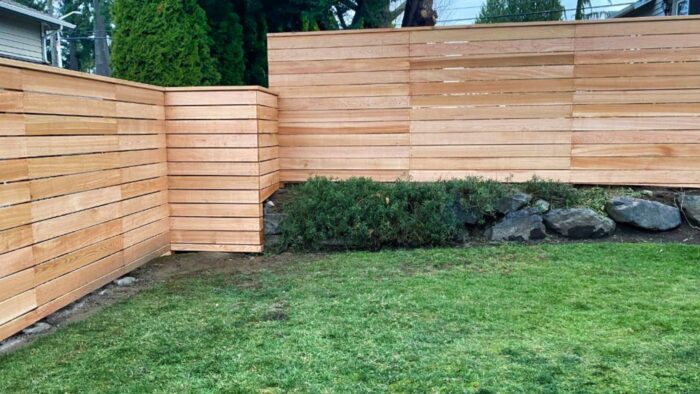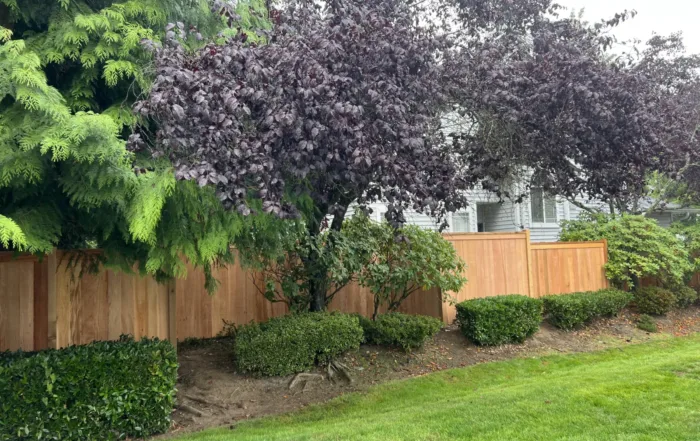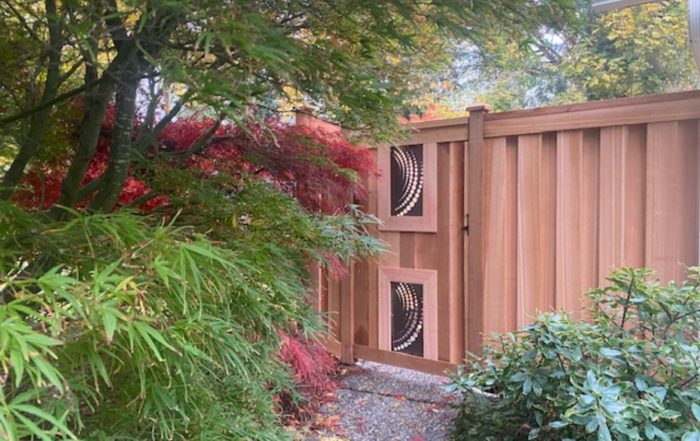You’ve just moved into your new home in the Pacific Northwest and, as you’re admiring the view of the gorgeous, green landscape around you, you suddenly realize that a fence would really complete the look. A quality fence can provide privacy and security while also adding to the aesthetic of your home.
When it comes to selecting the best type of fence for their Pacific Northwest home, many homeowners face a wide array of challenges. First, the climate in this region is known for its wet and cold weather, so selecting a fence that can withstand these harsh conditions is crucial. Additionally, there are a variety of different fences available to choose from including wood, wrought iron, vinyl, and chain link fences. Furthermore, homeowners need to consider the cost of installation and maintenance that comes with each type of fence as well as how long it will last them.
Picking the right fence can be a daunting task. With so many factors to consider it can be hard to know where to begin. Don’t worry – we’re here to help! In this article, we’ll provide you with all the information you need to make an informed decision about which type of fence is best for your Pacific Northwest home.
Different Types of Fences for the Pacific Northwest (Pros and Cons)
As mentioned, the climate in the Pacific Northwest is known to be wet and cold, so selecting the right type of fence is important for this region. There are a variety of different types of fences available, but each one needs to be chosen carefully based on factors such as cost, installation and maintenance costs, durability, and longevity. Here are just a few of the options available to you:
Cedar Wood Fences
Cedar fences are one of the most popular types of fence available for the Pacific Northwest. For starters, cedar is an excellent choice when it comes to durability as it is naturally rot and insect resistant. Cedar also has a natural beauty that makes it ideal for adding aesthetic value to your home. Additionally, cedar doesn’t require much maintenance and will last longer than other types of wood. A professionally installed Cedar fence can be expected to last up to 30 years if maintained.
Benefits of Installing a Cedar Wood Fence
- Natural durability and resistance.
- Low maintenance requirements.
- Aesthetic appeal.
- Long-term longevity.
- Can increase home value.
- Repairs are relatively simple. Wood boards can be replaced if damaged.
- Affordable.
Disadvantages of a Cedar Wood Fence
- Requires occasional maintenance to preserve aesthetic.
- Susceptible to rot in the ground. A professional installer using post on pipe construction will ensure this is not an issue.
- May fade if continually exposed to sunlight. Periodically treating the fence can minimize this.
- Costs of materials fluctuate with the market.
Wrought Iron Fences
If you’re looking for something a bit more ornamental, then wrought iron fences are an excellent choice. Not only are these fences aesthetically pleasing, but they also require very little maintenance and can last for up to 30 years. However, they may be more expensive than other materials, and they can be susceptible to rust over time if not properly maintained.
Benefits of Installing a Wrought Iron Fence
- Durability and resistance to rust.
- Low maintenance requirements.
- High-end aesthetic appeal and ornamental value.
- Long-term longevity.
- Versatility for different designs and layouts.
- Ability to add privacy or security.
Disadvantages of a Wrought Iron Fence
- Potential for rust. A quality iron fence that is well sealed is less likely to encounter this.
- A quality wrought iron fence can be expensive. There are some low cost options but you get what you pay for.
- The welded solid construction is not ideal for hills or graded areas.
- Availability. Can be difficult to find compared to lower cost aluminum options.
- Can be difficult to swap out panels if a section is damaged.
- Difficult to install.
- Lacks privacy.
Vinyl Fences
Vinyl fences are a great option for those looking for an affordable, low-maintenance solution. They require no painting or staining, and can last for up to 25 years. Additionally, they are available in a variety of styles and colors to suit any home’s look.
Benefits of Installing a Vinyl Fence
- Low cost and affordable.
- High-quality vinyl materials can resemble wood.
- Does not splinter or rot.
- Easy to maintain. No refinishing required.
- Does not attract insects.
- Variety of styles, colors, and textures.
- Can last up to 3o years if properly maintained.
- Versatility for different designs and layouts.
- Ability to add privacy or security.
Disadvantages of a Vinyl Fence
- High up-front costs.
- Prone to staining caused by algae, mold and mildew.
- Not a natural material like wood.
- Some fading may occur in areas continually exposed to sunlight.
- Repairs can be difficult. While uncommon, if a section is damaged the whole panel may need to be replaced.
Chain Link Fences
Chain link fences provide an effective barrier from the outside world while still allowing you to maintain a certain level of visibility. They are also relatively inexpensive, easy to install, and require little maintenance. However, they may not be the best option for those looking for a more aesthetically pleasing solution.
Benefits of Installing a Chain Link Fence
- Durability and resistance to corrosion.
- Low maintenance requirements.
- Low-cost option for areas with high traffic or severe weather conditions.
- Versatility for different designs and layouts.
- Ability to add privacy or security.
Disadvantages of a Chain Link Fence
- Rust can be an issue. A rust resistant coating can help.
- Lack of design options. There are affordable colored vinyl options which look more attractive than the standard metal.
- A basic chain link fence wont offer privacy or safety. Slats will need to be added for privacy and height will need to be considered to prevent anyone from climbing over the fence.
- Limited lifespan. Chain link fences last an average of 15-20 years. They can last longer if maintained.
- Chain link wont help you home value the way a wood or wrought iron fence will.
A Few Factors to Consider When Choosing a Fence
When it comes to installation and maintenance costs, the type of fence you choose can make a big difference. Some materials may be more expensive upfront, but require less maintenance over time. Others are more affordable initially, but need more regular upkeep. Consider your budget carefully when selecting the best option for you. An experienced and reputable fence contractor can guide you through the installation and maintenance costs. They can also make suggestions if you are on a budget.
The durability and longevity of your fence will depend largely on the type of material you choose. Some materials, such as cedar wood, are naturally rot and insect resistant and can last for up to 30 years. Whereas chain link fences may not be the most attractive option, but they do offer more budget friendly options and require little maintenance.
Finally, it’s important to consider the aesthetic value of your new fence. After all, a quality fence can add to the overall beauty of your home while providing you with much-needed privacy and security.
Choosing a Fence Contractor
When selecting a fence contractor for your Pacific Northwest home, it is important to choose someone experienced in the specific requirements of building a fence in this region. An experienced contractor will be able to guide you through the process and provide expert advice on which materials are best suited for your particular climate and needs. They should also be familiar with local building codes, so they can ensure that your fence meets all of the necessary regulations.
When selecting a contractor, be sure to research their experience and reputation thoroughly. Ask for referrals from previous customers and read reviews online. This will help you get a better sense of the quality of their work and help you make an informed decision about who to hire for the job.
A few questions to ask a potential fence contractor:
- Have long have you been building fences in the Pacific Northwest?
- Are they licensed and bonded?
- What kind of fences do they have available?
- Do they have references?
- Do they handle the permitting process?
- Do they have examples of their past work you can see?
- If using Cedar, do they use post on pipe construction to prevent rot?
- Will they contact the utility companies?
- How long does the installation take?
- Can they locate your property line?
- Is there a warranty?
Summary
The right fence can add beauty and functionality to your home while providing privacy and security. When it comes to installation and maintenance costs, the type of fence you choose can make a big difference. Some materials may be more expensive upfront, but require less maintenance over time. Others are more affordable initially, but need more regular upkeep. Consider your budget carefully when selecting the best option for you. Carefully choose an experienced contractor contractor who can work within your budget and guide you through the process.
FAQ
Q: What type of materials are best for a fence in the Pacific Northwest?
A: The most popular types of fences in this region are wood, wrought iron, vinyl, and chain link fences. Cedar wood is naturally rot and insect resistant and can last up to 30 years. Chain link fences may not be the most attractive option, but they do offer good protection from the elements and require little maintenance.
Q: How can I select a reliable fence contractor?
A: When selecting a fence contractor for your Pacific Northwest home, it is important to choose someone experienced in this region’s specific requirements for building a fence. Be sure to research their experience and reputation thoroughly by asking for referrals from previous customers and reading reviews online.
Q: What should I consider when selecting a fence?
A: When selecting a fence, it is important to take into account the climate and weather conditions of this region along with the cost of installation and maintenance. Additionally, keep in mind that the right fence can also add beauty and functionality to your home while providing much-needed privacy and security.
By taking these factors into consideration, you can select the perfect fence for your Pacific Northwest home. With the right material and contractor, you can enjoy beautiful and secure fencing for years to come.




